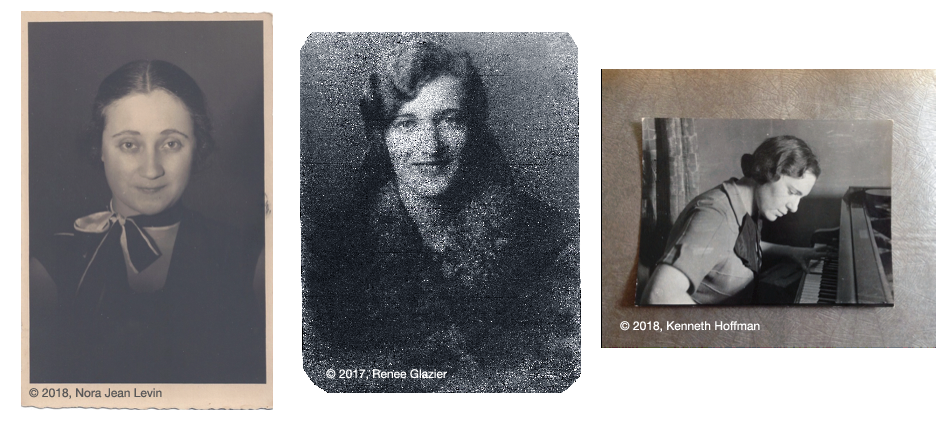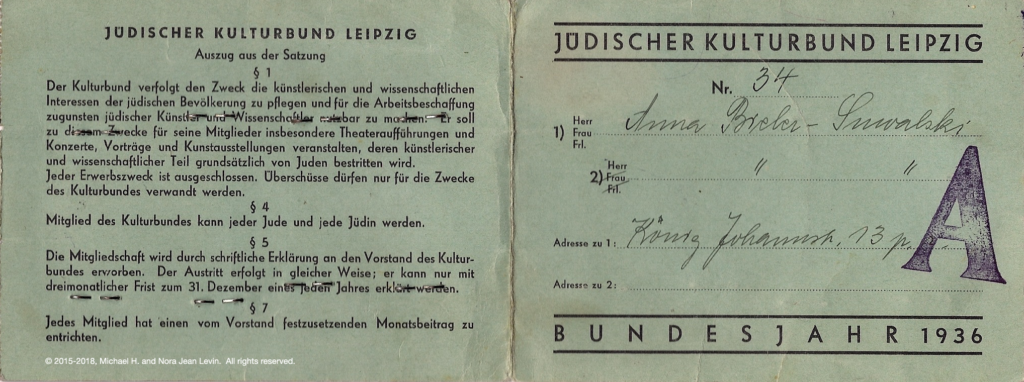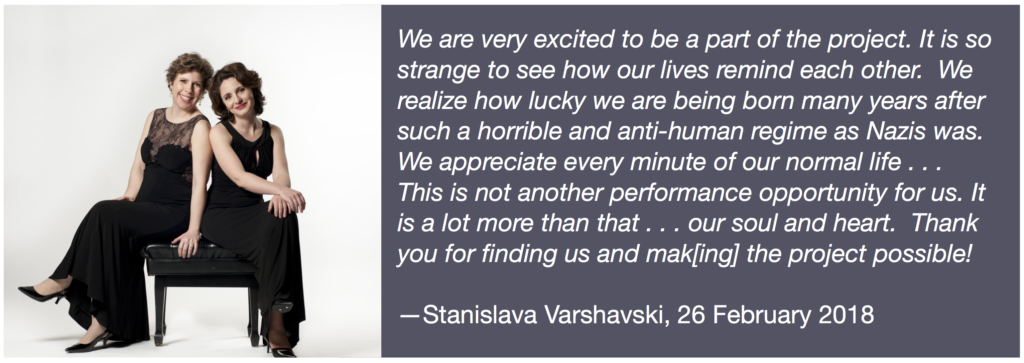Two Pianos: Playing for Life” — The Exhibit
Two Pianos is a one-hour live multimedia music-documentary performance that vividly tells the story of concert pianists Anna Burstein Bieler-Suwalski (born in Kishinev Romania) and Halina Neuman Schulsinger (born in Łodz Poland). Anna and Halina met at the Leipzig Conservatory in 1926 as “alien residents” on student visas, each motivated to cross borders and switch languages for the chance to study under legendary professors. Tanya Zunser Ury, a classmate whose Russian emigré parents had settled in Dresden, was a mutual friend. Anna and Tanya were awarded multiple scholarships to support their studies. Halina’s businessman father paid her way.

In 1934, as opportunities for Jewish artists to perform in public shrank under the Nazis, the three Conservatory graduates joined the Third Reich-approved “Jews only” cultural association—der Jüdische Kulturbund. Anna and Halina gave two-piano concerts at the Kulturbund’s Leipzig branch in 1934 and 1936. Tanya, a Board member, performed as a soloist.

In a striking parallel to current times, the young mothers fought to balance budding careers with small children and threats to family livelihoods while the Nazi net tightened. Two of them were married to emigré “East Jews” who settled and worked in Leipzig. The other had married a department-store magnate “born German” in Leipzig. In the end the Reich treated them all the same.
By 1938 Anna was resident in Tel Aviv performing on the British Mandate’s Palestine Broadcast System. Halina was in Salzburg playing Mozart at the famed Mozarteum—a few months before she was forcibly deported from Germany to Poland with thousands of other legally-resident Polish-born Jews. Tanya was in Switzerland with her children while her husband remained in Leipzig navigating the forced transfer of his retail empire to the Reichskommisariat.
Two Pianos follows these talented women through and past World War II as they transcend crises and borders to forge new careers, inspiring their own students while becoming naturalized Americans.
The production premiered June 9, 2018 at Philadelphia’s historic Settlement Music School, where Anna taught for almost 40 years. The parts of Halina and Anna were read by internationally-acclaimed “Four Hands” performers. Diana Shapiro (as Halina) was born in Moscow and Stanislava Varshavski (as Anna) was born in Kharkov — a younger iteration of gifted Jewish emigré women who also met at Conservatory (in this case, in Jerusalem), performed together, and came to live in the U.S. Diana and Stanislava will re-create parts of the Arensky, Brahms, and other selections played by Anna and Halina at their Leipzig and later concerts.
Halina and Jola is an excerpt of the Two Pianos: Playing for Life concert-documentary program, performed on October 27, 2019 at Paul Robeson Center (Rutgers-Newark NJ), sponsored by the University’s Institute of Jazz Studies.
The acclaimed Varshavski-Shapiro Piano Duo performed and read the main roles of Anna Burstein Bieler and Halina Neuman Schulsinger, concert pianists who met as ‘alien residents’ at the Leipzig Conservatory in the 1920s, performed two-piano concerts before segregated Jewish-only audiences under the Nazis, and remained lifelong friends. Parts of their 1934 and 1936 concerts are vividly recreated in the performance. The Piano Duo played Valse Musette by Francis Poulenc as an encore.
This venue-specific segment of the third Two Piano performance follows Halina and her daughter Jola from their expulsion to Poland in 1938 through their War and post-War years. They settled in Newark, where Halina eventually joined the Rutgers University music faculty and Jola became an inner-city schoolteacher. Kenneth Hoffman, Jola’s eldest son, is a narrator. This event took place 81 years after thousands of Polish Jews were forcibly deported overnight to Poland from the Third Reich, an event that triggered Kristallnacht two weeks later.
Origins of Two Pianos
In 1978, while juggling full-time jobs and raising a family, Michael and Jean Levin began taping the life stories of her father (a Polish-born early petroleum entrepreneur), her mother (a Russian-born concert pianist), their friend Halina, and their other formerly Central-European friends. Jean’s parents had just arrived in Philadelphia from their first return to Leipzig, where they met, married and lived until 1936.
Forty years later, the result of Michael and Jean’s quest to organize, understand and recapture those vanished worlds—the sourcebook Papers, Please: A Twentieth Century Odyssey—is a private Website repository of annotated first-person interviews enhanced by historical-context and theme chapters, audio clips, original photos, and travel or other documents. Two Pianos was developed from parts of Papers, Please with additional material provided by Halina’s grandsons.
To honor the Settlement School’s 100th anniversary in 2018, Two Pianos closes with Sixties Plus or Minus Players (below), a video with clips from 1992 of Anna, age 84, performing with a Mozart quartet. The quartet was convened through a still-existing Settlement School chamber music program for seniors that was started in 1988 by Jean’s older sister Tania Bieler Haftel (1933-2017). The original sequence was recorded by Anna’s grand-daughter Stephanie Haftel—an example of the continuities that weave through this tale.
An exhibit of original concert materials and other objects accompanies the program, with an exhibit catalogue envisioned for a future date.
About the Performers
Stanislava Varshavski and Diana Shapiro began playing together in 1998. They have captured top prizes at numerous competitions, including the most prestigious competition for piano duos—the Murray Dranoff International Piano Competition in Miami. A winner of Astral Artists’ 2012 National Auditions, the Varshavski-Shapiro Piano Duo also won first prizes at Italy’s XV Piano Competition “Rome 2004,” Jerusalem’s Kol HaMusica Young Artists Competition, the Israel Chamber Music Competition, the XIII Schubert Competition in the Czech Republic, and the First International Piano Duo Competition in Bialystok Poland.

Varshavski and Shapiro hold Bachelor and Master degrees from the Jerusalem Academy of Music and Dance, where they studied with legendary Israeli duo Alexander Tamir and Bracha Eden. They continued their education under renowned American pianist Victor Rosenbaum. In 2011 both pianists completed doctoral degrees at the University of Wisconsin-Madison. Shapiro is an Assistant Professor of Piano and Chair of the Music Department at Silver Lake College. Varshavski is Director of Education at the Holy Family Conservatory of Music. They live near Milwaukee.
The Varshavski-Shapiro Piano Duo is internationally represented by Astral Artists.
At the Two Pianos premiere, Michael Levin performed as Hirsch Bieler-Suwalski (Anna’s husband). Jean Levin (Anna’s daughter) and Ken Hoffman (Halina’s grandson) were the narrators.
Artist stories and sample interviews
Kulturbund Artists
Shared Stories
Current-day Artists
Featured Short Stories
Theatre Workshop Artists
